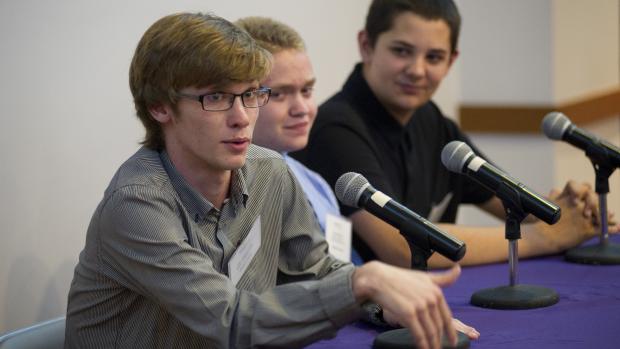Schooling the Instructors: High School Teachers Attend Cyber Security Boot Camp

When asked how he’d know that the Cyber Security Boot Camp he organized with two other professors at the Polytechnic Institute of New York University (NYU-Poly) had been successful, Nasir Memon, director of NYU-Poly’s Information Systems and Internet Security lab, joked, “If five years down the road, every high school kid wakes up thinking, ‘I should be in the CSAW forensics challenge.’”
Together with colleagues Vikram Kapila and Ramish Karri, Memon applied for funding from the National Science Foundation (NSF), which granted the trio, in collaboration with CUNY New York City College of Technology, $400,000 to coordinate the camp for two consecutive summers.
The funding allowed NYU-Poly to fly twenty-six high school teachers from around the country to the Institute’s campus in downtown Brooklyn, where they lodged at the boutique hotel Aloft and attended training sessions at the landmark Wunsch Building for one full week. There members of NYU-Poly’s faculty and recent graduates instructed the group on subjects, such as encryption and malware, covered in the forensics challenge of the Cyber Security Awareness Week (CSAW) competition held every fall at the Institute.
Tying It All Together
“Most of us teachers don’t have time to put it all together,” said Ralph Marchand, formerly a member of the tech industry. His would-be retirement turned into a career as a high school instructor in Florida, and although he’s well versed in the field of computer science, teaching keeps him too busy to craft an adequate curriculum. “The most positive thing about being here,” he said, “is it gives us a list of topics to use as bait.”
Getting students interested in computer science is a problem, admitted Moshe Caplan, valedictorian of last year’s NYU-Poly undergraduate class and an instructor at this year’s camp. “A lot of people think cyber security or hacking is one of those scary subjects that only certain people know well,” he said. “It’s more accessible than people think, so the challenge is to show them that it’s a cool topic that they really can learn and gain from.”
Financially, being an important point. As Tom Kellermann, vice president at Trend Micro and a former member of President Obama’s cyber security commission, told Mashable in May, the government needs to fill 10,000 cyber security positions soon, with the private sector needing to hire four times that number, a trend that’s only expected to continue. Camper Yevgenia Rivers, an instructor at Edward R. Murrow High School in Brooklyn, intends to share that news with her students, who may find special appeal in a career track with a long horizon, given the bleak job market. (According to The Washington Times, 32 percent of high school students had jobs in 1990; today that figure is halved.)
Lisa Donlan, a teacher at Newman Smith High School in Carrollton, Texas, believes convincing students of the value of cyber security won’t be as difficult as some think. “We hear about hacking, and it’s always talked about negatively,” she said. “Now I’m giving my students an outlet for positive things because it would be helping companies [catch the bad guys]. They’re going to be on fire for it.”
Stoking Teachers’ Interest
Equally important, though, is the instructors’ excitement, said Michael Terpak, a member of Zettabyte, the team from Red Bank Regional High School in New Jersey that won last year’s CSAW forensics challenge. “If you don’t have someone driving you to do it, you will not do it,” he said, speaking at a panel during the opening reception for the camp. “You definitely need someone behind you pushing you whenever you start slacking off.”
 The recognition that teachers need as much attention as do the competitors of the challenge was one of the driving forces behind the camp’s creation, said Memon. “If we want to make this truly national and get students from all over the country to compete,” he said, “we need to develop support infrastructure. Get the teachers involved. Get them interested.”
The recognition that teachers need as much attention as do the competitors of the challenge was one of the driving forces behind the camp’s creation, said Memon. “If we want to make this truly national and get students from all over the country to compete,” he said, “we need to develop support infrastructure. Get the teachers involved. Get them interested.”
“They can help the students help each other,” Memon continued, “and perhaps create a national community around CSAW to learn from each other and get more interested in cyber security.”
Caplan believes this is already happening. He overheard a cluster of campers during lunch discussing the morning’s training session, he said, and Marchand spoke about a brainstorming session he had with other teachers in the evening after trainings had officially ended. “The networking with other professionals has been priceless,” nods Mark Estep, who teaches at Poolesville High School in Maryland.

